
Ghana, officially the Republic of Ghana, is a country in West Africa. It abuts the Gulf of Guinea and the Atlantic Ocean to the south, sharing borders with Ivory Coast in the west, Burkina Faso in the north, and Togo in the east. Ghana covers an area of 239,535 km2 (92,485 sq mi), spanning diverse biomes that range from coastal savannas to tropical rainforests. With over 32 million inhabitants, Ghana is the second-most populous country in West Africa, after Nigeria. The capital and largest city is Accra; other major cities are Kumasi, Tamale, and Sekondi-Takoradi.
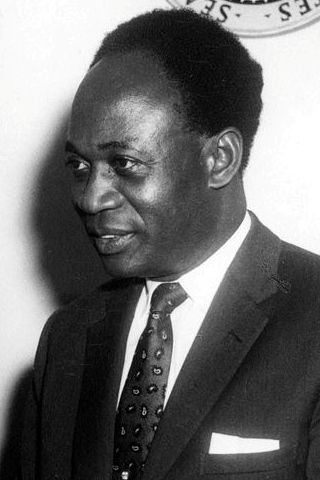
Francis Kwame Nkrumah was a Ghanaian politician, political theorist, and revolutionary. He was the first Prime Minister and President of Ghana, having led the Gold Coast to independence from Britain in 1957. An influential advocate of Pan-Africanism, Nkrumah was a founding member of the Organization of African Unity and winner of the Lenin Peace Prize from the Soviet Union in 1962.

The national flag of Ghana consists of a horizontal triband of red, gold, and green. It was designed in replacement of the British Gold Coast's Blue Ensign.

Komla Agbeli Gbedemah was a Ghanaian politician and Minister for Finance in Ghana's Nkrumah government between 1954 and 1961. Known popularly as "Afro Gbede", he was an indigene of Anyako in the Volta Region of Ghana.
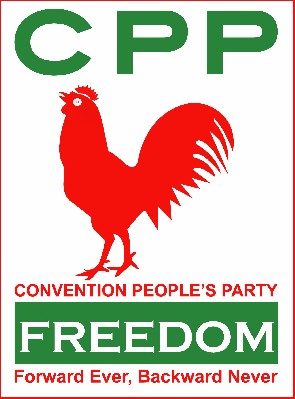
The Convention People's Party (CPP) is a socialist political party in Ghana based on the ideas of the first President of Ghana, Kwame Nkrumah. The CPP was formed in June 1949 after Nkrumah broke away from the United Gold Coast Convention (UGCC).
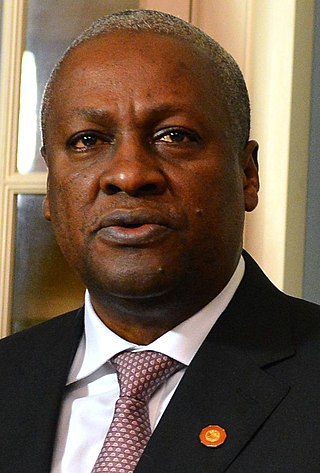
John Dramani Mahama is a Ghanaian politician who served as President of Ghana from 24 July 2012 to 7 January 2017. He previously served as Vice President of Ghana from January 2009 to July 2012, and took office as president on 24 July 2012 following the death of his predecessor, John Evans Fiifi Attah Mills.

The National Liberation Council (NLC) led the Ghanaian government from 24 February 1966 to 1 October 1969. The body emerged from a coup d'état against the Nkrumah government carried out jointly by the Ghana Police Service and Ghana Armed Forces with collaboration from the Ghana Civil Service.

Dr. Kwame Nkrumah was the first Prime Minister and first President of Ghana. Nkrumah had run governments under the supervision of the British government through Charles Arden-Clarke, the Governor-General. His first government under colonial rule started from 21 March 1952 until independence. His first independent government took office on 6 March 1957. From 1 July 1960, Ghana became a republic and Nkrumah became the first president of Ghana.

The mass media in Ghana, includes television, radio, internet publishing and newspapers.

China-Ghanaian relations refer to the current and historical relationship between the Republic of Ghana and the People's Republic of China (PRC).
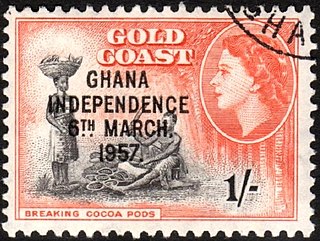
Ghana gained independence from the British on 6 March 1957. It is a member of the Commonwealth of Nations. The country became a republic on July 1, 1960.

Ghana–Iran relations refers to the current and historical relationship between Ghana and Iran. Ghana has an embassy in Tehran, and Iran has an embassy in Accra.
Tourism in Ghana is regulated by the Ministry of Tourism of Ghana. This ministry is responsible for the development and promotion of tourism related activities in Ghana.
Alhaji Mahama Iddrisu is a Ghanaian politician who was a member of the Provisional National Defence Council and a former Minister for Defence. He is a founding member of the National Democratic Congress. He is the longest-serving Minister of Defence of Ghana, serving from 1985 to 1999, for 14 years.

The history of African Americans in Ghana goes back to individuals such as American civil rights activist and writer W. E. B. Du Bois (1868–1963), who settled in Ghana in the last years of his life and is buried in the capital, Accra. Since then, other African Americans who are descended from slaves imported from areas within the present-day jurisdiction of Ghana and neighboring states have applied for permanent resident status in Ghana. As of 2015, the number of African-American residents has been estimated at around 3,000 people, a large portion of whom live in Accra.
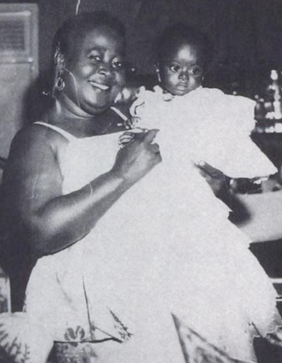
Hannah Esi Badu Kudjoe, née Hannah Dadson, was a prominent activist for Ghanaian independence in the 1940s and 1950s. She was one of the first high-profile female nationalists in the movement, and was the National Propaganda Secretary for the Convention People's Party. She was a political activist during the government of Dr. Kwame Nkrumah. She was also an active philanthropist and worked to improve women's lives in Northern Ghana. Hannah had the ability to bring people together. She was able to convince others to support and fight for independence. She helped Kwame Nkrumah in bringing people to join the CPP and support it. She once helped the Big Six when they were arrested by bringing people together to call for their release by the colonial government.

Ghana and North Korea established diplomatic relations in 1964.
Goodwin Tutum Anim, also known by the name Isaac Goodwin Aikins, was a Ghanaian journalist. He was the first African Managing Director of the Ghana News Agency and later Executive Secretary of the Ministry of Arts and Culture.

The Political history of Ghana recounts the history of varying political systems that existed in Ghana during pre-colonial times, the colonial era and after independence. Pre-colonial Ghana was made up of several states and ethnic groups whose political system was categorized by 3 main administrative models; Centralized, Non-centralized and Theocratic states. In the colonial era, the British Empire employed different forms of government among its four territorial possessions in the Gold Coast. Indirect rule was implemented in the late 19th century after its success in Northern Nigeria. From the 1940s, native Ghanaians yearned for more autonomy. This resulted in the several constitutional reforms as well as the creation of the office of the Prime Minister in 1952.
Kweku Budu-Acquah was a Ghanaian politician and diplomat. He served as Ghana's first ambassador Somalia and Ghana's resident Minister in Guinea from 1962 to 1964. He served as Ambassador Extra Ordinary and Minister Plenipontentary from 1964 until 1966 when the Nkrumah government was overthrown.













